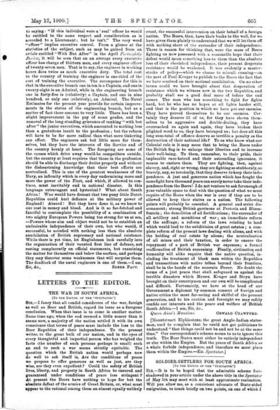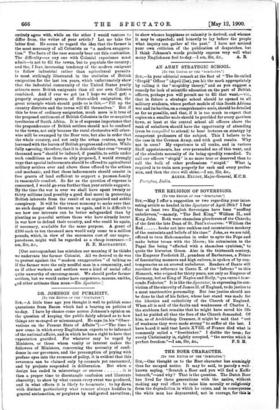SOLDIER-SETTLERS FOR SOUTH AFRICA. [TO THE EDITOR OF THE "SPECTATOR. "]
Sin,—It is to be hoped that the admirable scheme fore- shadowed in your article under the above title in the Spectator of May 5th may meet with at least approximate realisation. Will you allow me, as a consistent advocate of State-aided emigration, to touch briefly on two points, on one of which I
entirely agree with, while on the other I would venture to differ from, the writer of your article ? Let me take the latter first. He seems to regard the idea that the farmer is the most necessary of all Colonists as " a modern exaggera- tion." The facts of the case scarcely bear out this contention. The difficulty—as any one with Colonial experience must admit—is not to fill the towns, but to populate the country ; and the, I fear, increasing tendency of the modern emigrant to follow industrial rather than agricultural pursuits is most strikingly illustrated in the statistics of British emigration for the last ten years, which unfortunately show that the industrial community of the United States yearly attracts more British emigrants than all our own Colonies combined. And if ever we get (as I hope we shall get) a properly organised system of State-aided emigration, the great principle which should guide us is this,—" Fill np the country districts and the towns will fill themselves." But if this be true of ordinary emigration, much more is it true of the proposed settlement of British Colonists in the re-acquired territories of South Africa. It is of supreme importance that the preponderance of British settlers should not be confined to the towns, not only because the rural electorates will other- wise still be swamped by the Boer vote, but also in order that the whole country, and not only the urban centres, may be leavened with the leaven of British progress and culture. While folly agreeing, therefore, that it is desirable that even " twenty thousand men " should be induced, if possible, to settle under such conditions as those so ably proposed, I would strongly urge that special inducements should be offered to agricultural military settlers over and above those offered to the artisan and mechanic, and that these inducements should consist in free grants of land sufficient to support a yeoman-family in reasonable comfort. So far as the question of expense is concerned, I would go even further than your article suggests. By the time the war is over we shall have spent twenty or thirty millions (and possibly a good deal more) in protecting British interests from the result of an organised and subtle conspiracy. It will be the truest economy to make sure that no such danger shall threaten us again, and it is difficult to see how our interests can be better safeguarded than by planting as peaceful settlers those who have already learnt in war how to defend their country, and who could be again, if necessary, available for the same purpose. A grant cf £100 each to ten thousand men would only come to a million pounds, which, in view of the enormous cost of our unpre- paredness, might well be regarded as a cheap insurance.—I [Our correspondent has mistaken our meaning if he thinks we underrate the farmer Colonist. All we desired to do was to protest against the " modern exaggeration " of talking as if the farmer were the only needful man in a community, and as if other workers and settlers were a kind of social offal quite unworthy of encouragement. We should prefer farmer settlers, but we would rather have carpenters, masons, smiths, and other artisans than none.—ED. Spectator.]







































 Previous page
Previous page